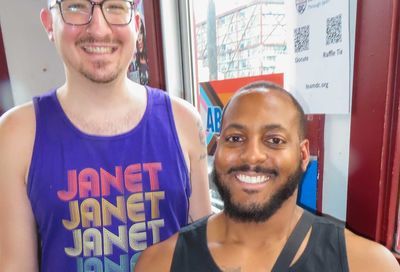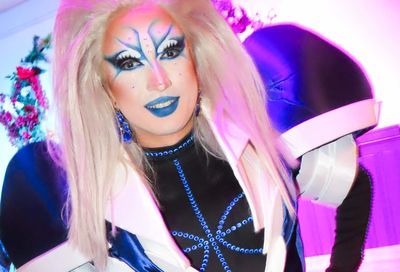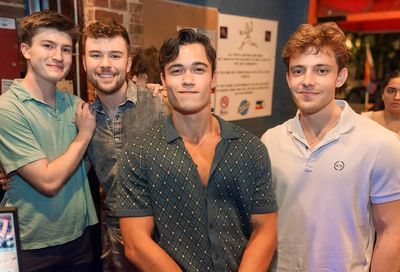Queer Native American Artist Marx Cassity Talks New Music
"My hope is to reach any Indigiqueer person and say: you are honorable, and your life is precious."

Marx Cassity just released their latest album 2Sacred in time to celebrate Native American Heritage Month, but that’s not the project’s only purpose. The set, which spans genres and tackles some really heavy topics, has a grand goal — to help all queer Native American people, especially youths, feel that they have a space in this world.
The singer-songwriter grew up queer on the Osage reservation in Oklahoma, and knows what it’s like to not fit in. As a professional trauma therapist, they work with young people to heal them, and now they’re looking to do the same through music. Some people are just meant to make the world a better place, it seems.
Cassity answered some questions about their new album and why they felt compelled to write and sing about such weighty issues, like suicide and the struggles faced by Native American peoples in today’s world.
1. Tell me about this album and the themes you write about.
2Sacred is a 10-song folktronic rock album with Native-nuanced lyrics and singing styles, supported by an NDN Collective Radical Imagination grant. It was inspired by a statistic from the Trevor Project that found that 33% of Native American LGBTQ youth attempted suicide in 2020.
I wanted to tap into my lived experience as an Indigiqueer songwriter and trauma therapist to create something in response. It ended up also being an album written for my younger self, who struggled with coming out in the 1980s in Oklahoma.
I also created a music video for the song How Long that depicts Indigiqueer trauma and community healing, along with some stunning portraits of contemporary two spirit people. I’ve heard from folks it’s making a difference in their lives, and I’m really moved by that. It was always my hope to make something that would have a positive impact on people.
2. How is growing up queer in the Native American community different from other communities?
I talk with many queer Natives Americans and their allies, and also have my own experience. A common theme is the need for the basics of safety and legal rights, but also a great need for visibility, representation and honoring.
Queerness is nothing new in tribal societies. Upon first contact, Europeans wrote about seeing, in what is now called the United States, over 130 tribes with gender diverse and queer people living as part of those tribes. We also have our own oral histories and words depicting queerness such as Mi.xo.ge in Osage, Winkte in Lokota, Nádleehi in Navajo. This queerness was heavily impacted by the genocide of the cultural ways of many tribes by religion that was forced upon the people who had to comform in order to survive.
We are now in a significant Landback movement of decolonization, which is a call for the return of land, language, ceremony, language, and kinship in our Native communities in North America. A very important part of this is the decolonization of sexuality and gender as this vital part of Native culture has been impacted by colonization as well.
3. What difficulties does your community face that others don’t?
The two spirit community faces similar issues as the broader LGBTQ communities in this current political warfare by the conservative right. However, many Indigiqueer folks also face that same erasure and harm in their own Native nations and families.
Either folks are silent and don’t advocate for their Indigiqueer constituents and community members, or they also perpetuate harm by using fundamental religion and conservative politics to delegitimize their existence. There is also a limited understanding by the non-native LGBTQ community of the existence two spirit people and the important history of gender diversity and queerness in tribal societies. This can lead to the mainstream LGBTQ culture working within a colonized understanding of gender and sexuality that further harms and erases Indigiqueer folks.
4. Why did you decide that making this album was a way to help others?
When I came out as a teen in the ’80s in the depths of the AIDS crisis in the Bible Belt of Oklahoma while living on a Native reservation, I was ostracized by many people and intuitions around me.
The thing that helped me stay alive was the visibility of other queer people who came out. Movements such as ACT UP in NYC inspired us in Oklahoma to be brave enough come to march in the first Pride parade in Oklahoma City in 1989. Artists such as Bronski Beat in 1983 with the song and music video “Smalltown Boy,” and Ani DiFranco in the ’90s coming out as bisexual, as well as local Oklahoma artists such as Peggy Johnson, a lesbian folk singer in Oklahoma City, encouraged me to stay alive, and to be myself. This was vital.
I am sad that we still so deeply need folks to be out and encouraging those who are isolated and suffering, but I am trying my best to give back, be visible, and make a difference in someone’s life.
5. Tell me more about your musical career. It seems like you just started with this album?
I have always played and performed music, singing Johnny Cash songs to my aunties in Oklahoma as a small child, as well as receiving classical piano training all the way into college as a music major. I ended up in nursing during the AIDS crisis, and I always played cover songs at AIDS fundraisers, but I left Oklahoman in 1997 to heal my own PTSD.
I wrote my first songs at 30 and began performing in a fabulous artist community in Boulder Colorado, and eventually went on to live in California for many years where I recorded albums and also became a trauma therapist. My last album Songs From the Well was produced by Julie Wolf who played keyboard with Indigo Girls and Ani Difranco and was met with favorable reviews.
2Sacred is actually my fourth studio album! But you’re right it’s also a new beginning in some ways. I am performing under the name Marx Cassity for this album, as I added and X to my first name to honor my own two spirit/nonbinary identity and bring visibility to gender diversity as this very old thing in tribal societies.
6. Outside of music, you’re a therapist. Tell me more about that work.
Again, it really goes hand in hand with being a musician. To me they are the same thing. I have done tremendous amounts of self-help and healing work, and had many great teachers, healers, therapists, and medicine people around the world help me and teach me.
I often take what I learn from them and sing about it. I sing about the hardship of being Native, queer, genderqueer, the shadow of this, as well as the encouraging words of how to heal or turn the shadow into healing. I also have a deep spiritual practice that has led to inspiration and guidance from other dimensions, what I call the astral, and I get information from ancestors and spirit guides for the songs. It’s always been my way of integrating what I learn, first singing it to myself, then offering it to others.
7. What do you wish people understood about two spirit identity?
That gender diversity and queerness are very old ways of being. We are creative beings, with a Creator, so what is new is the way we express queerness. There are still tribal societies today that require queer community members to be present to have a proper ceremony. We have often been the healers, the medicine people, the counselors, the artists in cultures. Thus, when we uplift our queer people in society, we bring balance and well-being to all people, not just queer people.
8. What’s next for you?
I will continue to do the best I can to follow the guidance of my ancestors, trans-cetors, as they are my guides in showing up authentically, and being here for others as a singer, a therapist, and a community member.
I’ll be giving a keynote performance at Creating Change in New Orleans in January. In February I’ll be performing at an event the day after the BAAITS pow wow supported by the American Indian Cultural Center of San Francisco. And in June I’ll take part in a two spirit event titled Uniting Resilience in South Dakota.
My hope is to make my way to two spirit and Pride gatherings across the U.S. in 2024 to join the community and help carry this message of safety, legal rights, visibility and honoring for those who are still in suffering, isolation, or in harm’s way. My hope is to reach any Indigiqueer person and say: you are honorable, and your life is precious.
Support Metro Weekly’s Journalism
These are challenging times for news organizations. And yet it’s crucial we stay active and provide vital resources and information to both our local readers and the world. So won’t you please take a moment and consider supporting Metro Weekly with a membership? For as little as $5 a month, you can help ensure Metro Weekly magazine and MetroWeekly.com remain free, viable resources as we provide the best, most diverse, culturally-resonant LGBTQ coverage in both the D.C. region and around the world. Memberships come with exclusive perks and discounts, your own personal digital delivery of each week’s magazine (and an archive), access to our Member's Lounge when it launches this fall, and exclusive members-only items like Metro Weekly Membership Mugs and Tote Bags! Check out all our membership levels here and please join us today!
























You must be logged in to post a comment.